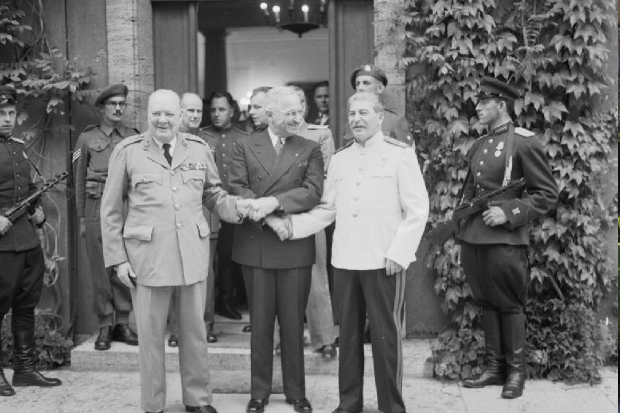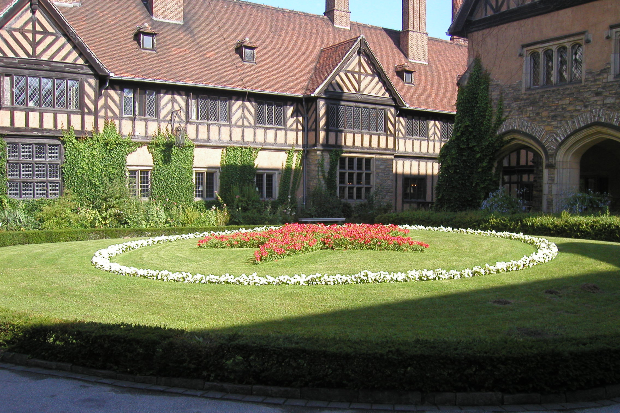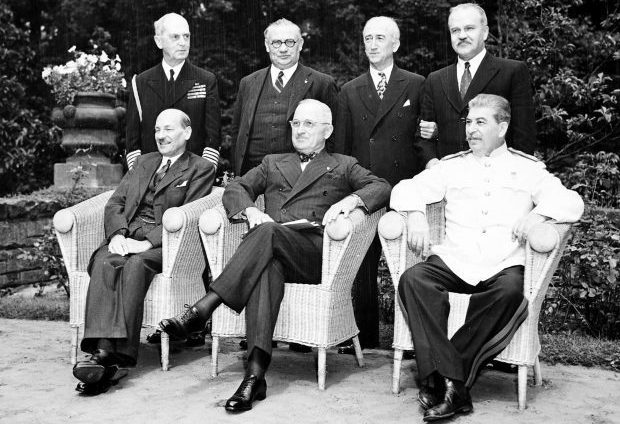'We must base our foreign policy on the principle of co-operation between the three World Powers.' (Memo. by Sir Orme Sargent, 11 July 1945)[1]

Seventy-five years ago, President Harry Truman, Marshal Josef Stalin and Prime Minister Winston Churchill, leaders of the victorious wartime Alliance, met in the Cecilienhof Palace in a small town outside Berlin, for the Potsdam Conference. Between 17 July and 2 August, American, British and Russian delegations discussed all the major issues confronting the post-war world. It was the last of the great tripartite conferences of the Second World War.

The last great conference
In fact, the war was not yet over. Though victory was achieved in Europe, fighting continued against Japan. The day before Potsdam opened, the atomic bomb was tested successfully in New Mexico. Its use, on 6 and 9 August, would lead to Japanese surrender and the final end to the global conflict. At Potsdam, Truman would tell Stalin about the ‘atomic secret’ supposedly known only to the US, UK and Canada. But Stalin already knew about it, from Soviet spies in the Manhattan Project and elsewhere.
Many decisions about the post-war world had been taken earlier, including at Yalta in February 1945.[2] At the San Francisco Conference, which ended on 26 June 1945, the United Nations Organisation had been established. But much remained for discussion at Potsdam, including European economic reconstruction, international waterways, Iran, Italian colonies, constitutional crisis in Belgium, elections in Greece, civil war in China and the future of the Middle East.
A contentious issue was the future of defeated Germany: its administration, industrial disarmament, allocation of reparations, and how its people should be treated, fed, housed and re-educated. The fate of many thousands of refugees and displaced persons, as well as Prisoners of War, had to be considered.
Britain’s predicament
To mark the 75th anniversary FCO Historians have published a collection of documents: Britain and the making of the Post-War World: the Potsdam conference and beyond. The publication includes previously unpublished intelligence material, gives real insights into the challenges the British government faced.
View a digital version on the FCO Historian’s issuu page or you can buy a copy.
See of the book’s editors, Gill Bennett, discuss events at Potsdam and Britain’s place in the immediate post-war world in conversation with FCO Chief Historian Patrick Salmon.
Watch the video discussing Britain and the making of the post-war world.
For all except the US, the end of war meant economic crisis. Britain was bankrupt: economist JM Keynes talked of a ‘financial Dunkirk’. Financial help from the US would be essential if Britain was to meet its global responsibilities.
Britain was one of the Big Three. But would it still be a ‘Great Power’ in the post-war world, or squeezed between the Soviet and US Superpowers? This was a question that preoccupied ministers and Foreign Office officials at Potsdam.
During the conference there was a change of government in Britain. Results of the 5 July General Election were not declared until 26th.[3] Churchill, who had flown home expecting to triumph, was defeated. A Labour landslide meant that Clement Attlee and Ernest Bevin flew back to Potsdam to lead the British Delegation as Prime Minister and Foreign Secretary. Both men had been in the War Cabinet, and Attlee had attended Potsdam from the start. The British negotiating line did not change.

At Potsdam, the Big Three worked together and hoped for postwar collaboration. No one foresaw 40 years of ‘Cold War’. But mutual suspicion underpinned the Potsdam discussions. Stalin feared the dominance of Western capitalism, while Britain and the US worried about communist influence in Europe. No peace treaty was signed at Potsdam, and many difficult issues remained to be settled.
But in an important sense, the Potsdam Conference represented a doorway between the old world and the new.
Keep tabs on the past: sign up for our email alerts
Follow our Foreign & Commonwealth Office Historians on Twitter @FCOHistorians
References
[1] Sargent’s memorandum, ‘Stocktaking after VE Day’, included in the new FCO Historians’ publication, Britain & the Making of the Post-War World: The Potsdam Conference & Beyond.
[2] See https://history.blog.gov.uk/2015/02/04/whats-the-context-4-february-1945-the-yalta-conference-opens/
[3] The delay was to allow time for British servicemen and servicewomen to vote, and for counting.